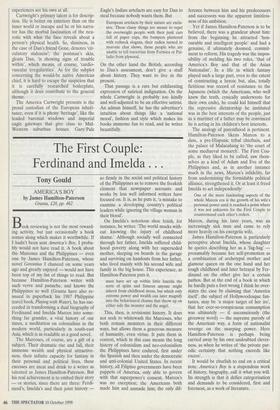The First Couple: Ferdinand and Imelda . . .
Tony Gould
AMERICA'S BOY by James Hamilton-Paterson Granta, £20, pp. 462 Book reviewing is not the most reward- ing activity, but just occasionally a book comes along which makes it worthwhile. If I hadn't been sent America's Boy, I proba- bly would not have read it. A book about the Marcoses and the Philippines — even one by James Hamilton-Paterson, whose novel Gerontius I chanced on some years ago and greatly enjoyed — would not have been top of my list of things to read. But because Hamilton-Paterson writes with such verve and panache, and knows the Philippines so well (Granta have also re- issued in paperback his 1987 Philippine travel book, Playing with Water), he has suc- ceeded in transforming a dual biography of Ferdinand and Imelda Marcos into some- thing far grander, a vital history of our times, a meditation on colonialism in the modern world, particularly in south-east Asia, which is as readable as a good novel.
The Marcoses, of course, are a gift of a subject. Their dramatic rise and fall, their immense wealth and physical attractive- ness, their infinite capacity for fantasy in their personal and political lives, these excesses are meat and drink to a writer as talented as James Hamilton-Paterson. But his real achievement is to embed their story — or stories, since there are three: Ferdi- nand's, Imelda's and their joint history — so firmly in the social and political history of the Philippines as to remove the freakish element that newspaper accounts and works by less well informed writers have focused on. It is, as he puts it, 'a mistake to examine a developing country's political leaders while ignoring the village woman in their blood'.
On Imelda's notorious shoe fetish, for instance, he writes: 'The world mocks with- out knowing the injury of childhood shame.' Although socially well connected through her father, Imelda suffered child- hood poverty along with her superseded mother, sleeping on boards in the garage and surviving on handouts from her father, who lived mainly with his second wife and family in the big house. This experience, as Hamilton-Paterson puts it,
must have set up within little Imelda the sorts of splits and fissures anyone might inherit from childhood stress, but which only extreme power and wealth can later magnify into the behavioural chasms that throw up on either side the monster and the angel.
This, then, is revisionist history. It does not seek to whitewash the Marcoses, who both remain monsters in their different ways, but allows them a generous measure of humanity, even virtue. It puts them in context, which in this case means the long history of colonialism and neo-colonialism the Philippines have endured, first under the Spanish and then under the democratic and anti-colonial United States. In recent history, all Filipino governments have been puppets of America, only able to govern with that superpower's consent. Marcos's was no exception; the Americans both made him and unmade him; the only dif- ference between him and his predecessors and successors was the apparent limitless- ness of his ambition.
Yet if James Hamilton-Paterson is to be believed, there was a grandeur about him: from the beginning he attracted 'hon- ourable and intelligent people' and had a genuine, if ultimately doomed, commit- ment to reform. His tragedy was the impos- sibility of melding his two roles, 'that of America's Boy and that of the Asian Nationalist'. In a life in which fantasy played such a large part, even to the extent of constructing a heroic but, alas, totally fictitious war record of resistance to the Japanese (which the Americans, who well knew the truth, cynically underwrote for their own ends), he could kid himself that the repressive dictatorship he instituted was in the best interests of the people, just as a martinet of a father may be convinced he is acting in his children's best interests.
The analogy of parenthood is pertinent. Hamilton-Paterson likens Marcos to a datu, a pre-Hispanic tribal chieftain, and the palace of Malacanang to 'the court of some mediaeval monarch'. The First Cou- ple, as they liked to be called, saw them- selves as a kind of Adam and Eve of the Philippines and, as in another instance much in the news, Marcos's infidelity, far from undermining the formidable political alliance, strengthened it. Or at least it freed Imelda to act independently:
One of the more fascinating aspects of the whole Marcos era is the growth of his wife's personal power until it reached a point where it was not unknown for the First Couple to countermand each other's orders.
Marcos, during his later years, was an increasingly sick man and came to rely more heavily on his energetic wife.
James Hamilton-Paterson is particularly perceptive about Imelda, whose daughter he quotes describing her as a Tag-hag' — presumably because her self-promotion as a combination of archetypal mother and glamour queen on the one hand and her tough childhood and later betrayal by Fer- dinand on the other give her a certain pathos. But at the end of a book in which he hardly puts a foot wrong I think he over- states the case by claiming that 'America itself, the subject of Hollywoodesque fan- tasies, may be 'a major target of her ire', that her ever-so-conspicuous consumption was ultimately — if unconsciously (the giveaway word) — the supreme parody of the American way, a form of nationalist revenge on the usurping power. Here Hamilton-Paterson is perhaps being carried away by his own undoubted clever- ness, as when he writes of 'the private par- odic certainty that nothing exceeds like excess'.
It would be churlish to end on a critical note. America's Boy is a stupendous work of history, biography, call it what you will. Its strength is that it defies categorisation and demands to be considered, first and foremost, as a work of literature.










































































 Previous page
Previous page